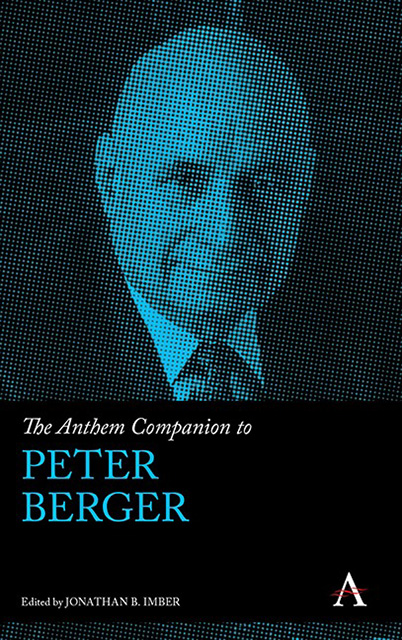Book contents
- Frontmatter
- Contents
- Introduction
- Chapter 1 Plurality, Choice, and The Dynamics of Doubt
- Chapter 2 Peter L. Berger and The Challenge of Modern Pluralism
- Chapter 3 Making Peace With Pluralism In America
- Chapter 4 Religion and Secularity in A Desecularizing Russia
- Chapter 5 The Moral Limits of Religious Pluralism
- Chapter 6 Peter L. Berger and Arnold Gehlen: Secularization, Institutions and Social Order
- Chapter 7 Peter L. Berger’s Three Religions
- Chapter 8 Objectivation: The Material Heritage of Peter L. Berger
- Chapter 9 Peter L. Berger’s The Social Construction of Reality
- Chapter 10 The Untaken Road to Phenomenological Sociology
- Chapter 11 Cheering for Capitalism
- Chapter 12 Peter L. Berger and Economic Sociology
- Chapter 13 Peter L. Berger Changed The Direction of My Work … and My Life
- Chapter 14 Peter L. Berger On Religion as Choice Rather Than Fate
- List of Contributors
- Index
Chapter 3 - Making Peace With Pluralism In America
Published online by Cambridge University Press: 17 October 2023
- Frontmatter
- Contents
- Introduction
- Chapter 1 Plurality, Choice, and The Dynamics of Doubt
- Chapter 2 Peter L. Berger and The Challenge of Modern Pluralism
- Chapter 3 Making Peace With Pluralism In America
- Chapter 4 Religion and Secularity in A Desecularizing Russia
- Chapter 5 The Moral Limits of Religious Pluralism
- Chapter 6 Peter L. Berger and Arnold Gehlen: Secularization, Institutions and Social Order
- Chapter 7 Peter L. Berger’s Three Religions
- Chapter 8 Objectivation: The Material Heritage of Peter L. Berger
- Chapter 9 Peter L. Berger’s The Social Construction of Reality
- Chapter 10 The Untaken Road to Phenomenological Sociology
- Chapter 11 Cheering for Capitalism
- Chapter 12 Peter L. Berger and Economic Sociology
- Chapter 13 Peter L. Berger Changed The Direction of My Work … and My Life
- Chapter 14 Peter L. Berger On Religion as Choice Rather Than Fate
- List of Contributors
- Index
Summary
Secularization theory once held paradigmatic status in the study of religion and modernity—a prominence due in part to the sophistication with which it was articulated by the eminent sociologist Peter L. Berger. But in one of the most famous scholarly turnabouts in academic history, in the 1990s, Berger renounced his adherence to secularization theory and began developing an argument that a theory of pluralization should decisively displace secularization theory as the paradigm for understanding religion. Berger laid out the contours of this theory in a number of places, including the 2012 Society article “Further Thoughts on Religion and Modernity,” and in his 2014 book, The Many Altars of Modernity: Toward a Paradigm for Religion in a Pluralist Age. The theory is bold and important, not only because of the empirical claims it makes about religious resilience, but because of its normative dimensions and implications.
The Empirical Claim
Contra secularization theory, Berger (2012, 313) argued that “modernity does not necessarily produce a decline of religion.” However, modernity “does necessarily produce a deepening process of pluralization—a historically unprecedented situation in which more and more people live amid competing beliefs, values, and lifestyles.” Berger further specified the modern situation vis-à-vis religion as consisting of two pluralisms. By two pluralisms Berger meant that (1) there is increasing diversity of religious communities living in the same society, and (2) there is at the same time a complex and critically important interaction between these religious communities and a powerful secular discourse—“a default secular discourse [that] co-exists with a plurality of religious discourses, both in society and in consciousness.”
The Normative Dimension
The outcome of successfully managed pluralism is, according to Berger (2014, 1), “a social situation in which people with different ethnicities, worldviews, and moralities live together peacefully and interact with each other amicably.”
In this chapter, I offer reflections on the important implications and enduring questions that Berger’s pluralist thought suggests vis-à-vis the American sociopolitical, religious, and legal experience. The American case is inevitably an important one in any discussion of modernization, religion, secularization, and pluralization. It was America, after all, that was always the most obvious problem for secularization theory.
- Type
- Chapter
- Information
- The Anthem Companion to Peter Berger , pp. 21 - 34Publisher: Anthem PressPrint publication year: 2023

